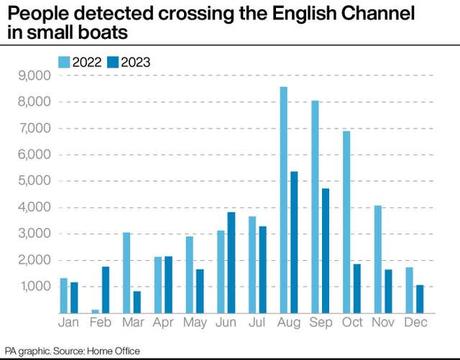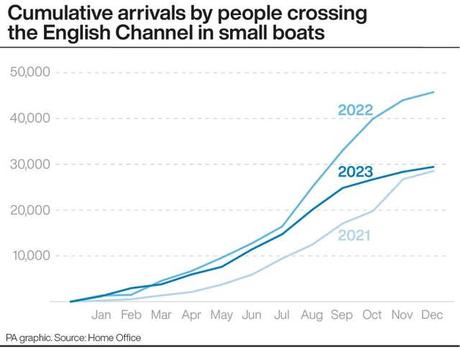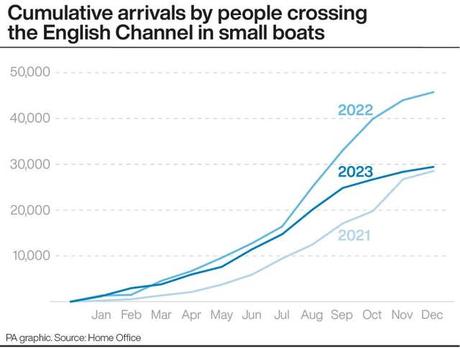The Prime Minister credited the "ruthless action" after the government announced it had achieved a target to clear the backlog of asylum applications.
The Home Office said on Monday that Rishi Sunak's "commitment to clear the legacy asylum backlog has been met" and that it had processed a total of more than 112,000 asylum cases by 2023.
Officials also made the "highest annual number of substantive decisions in a year since 2002," the report said.
Mr Sunak told the Daily Express: "The progress is the result of relentless action to tackle illegal migration over the past year.
"When I laid out my blueprint for stopping the boats, clearing the old backlog was an important part of that."
Mr Sunak previously pledged to withdraw older asylum claims by the end of 2023, directing the Home Office to tackle the number of so-called 'legacy' claims.
But Labor accused the government of making false claims about meeting the target, with figures suggesting the department had not reached the target number.
The Home Office said all cases in the old backlog have now been assessed, with 86,800 decisions made, but "4,500 complex cases have emerged that require additional checks or investigation before a final decision can be made".
Such cases usually involve "asylum seekers presenting themselves as children - where age verification takes place; people with serious medical problems; or those with suspected past convictions, where checks could reveal crime that would prevent asylum," the department added.
Before the official figures are published on Tuesday morning, the Home Office has reportedly processed around 25,200 newer asylum applications, in addition to 86,800 decisions in older cases, bringing the provisional number of total decisions made in the year to 112,000.
Officials say as many decisions as possible were made based on the past backlog, and that the outstanding cases arose from the department not wanting to compromise on safety and needing to ensure additional checks were in place. They believe that efforts to also clear some of the newer cases at the same time signal a commitment to addressing the overall asylum backlog.
The story continues
In a four-week period from November 20 to December 17, 20,481 initial asylum decisions were made - more than the number of asylum decisions in all of 2021, the Home Office said.
The award rate for final asylum decisions on fully completed cases was 67% in 2023, lower than in 2022 and 2021 (76% and 72%).
Mr Sunak laid out a five-point plan to try to get the migrant crisis under control in the House of Commons in December 2022, saying: "Unless we act now and decisively, this will only get worse."
In addition to a raft of new measures unveiled to curb Channel crossings, he told MPs that "we expect to clear the backlog of initial asylum decisions by the end of next year" after hiring more caseworkers and overhauling the system for processing applications.

But his vow was almost immediately questioned by Labor amid confusion over the scale of his ambition.
Within hours of the announcement, Downing Street appeared to cut the target, saying only a proportion of outstanding applications would be met. The Border Act has come into force.
In February last year, the Home Office said thousands of asylum seekers would receive questionnaires that could be used to decide their claims, as part of efforts to tackle the growing backlog of cases and speed up the processing of applications.
About 12,000 people from Afghanistan, Syria, Eritrea, Libya and Yemen, who had claimed asylum in Britain and were awaiting a decision, would be eligible under the policy that would ask them to complete the form rather than be automatically interviewed .
Whitehall's spending watchdog said in June that efforts to tackle the asylum backlog needed to be significantly increased to meet Sunak's target, and questioned whether the plans were sustainable.
The National Audit Office also estimated that £3.6 billion was spent on asylum support in the 2022-2023 period, almost double the amount of the previous year.
MPs later asked senior Home Office officials how the target was being achieved, as figures showed 17,316 asylum applications were withdrawn in the year to September 2023 - a sharp increase that was more than four times the previous year, when there were 4,260. They also expressed surprise when officials suggested the department did not know where these asylum seekers were.
The Commons Home Affairs Committee heard in November that claims were being withdrawn when asylum seekers failed to turn up for interviews or complete questionnaires and "did not engage with the system that leads to a decision".


Other reasons included someone having already left the UK before their claim was considered, or choosing to make a new application for permission to stay in the country, the ministry said.
The Home Office said more case workers had been tasked with processing applications, which "tripled productivity to ensure more illegal migrants are returned to their countries of origin more quickly".
But last month the department's top official, permanent secretary Sir Matthew Rycroft, revealed in a letter to MPs that only 1,182 migrants who had crossed the Channel had been returned to their home countries since 2020, out of a total of more than 111,800 who arrived. in that period.
The majority were Albanian - a country with which Britain has a return agreement - and only 420 were returned to other countries.
Asked whether that was an "acceptable figure" by the Home Affairs Committee, Illegal Migration Secretary Michael Tomlinson said: "As far as I'm concerned the figures should be significantly higher than they are."
Mr Sunak said he was "determined to end the burden of illegal migration on the British people", adding: "By clearing the legacy asylum backlog and deciding more than 112,000 cases , we will save the taxpayer millions of pounds in expensive hotel costs, putting pressure on public services and ensuring the most vulnerable get the right support.
"But we cannot be complacent, which is why I am focused on delivering on my promise to stop the boats and get flights to Rwanda off the ground."
Labour's shadow immigration minister, Stephen Kinnock, said that "slicing or renaming the figures cannot disguise" the fact that the asylum backlog had "widened under the Tories".
